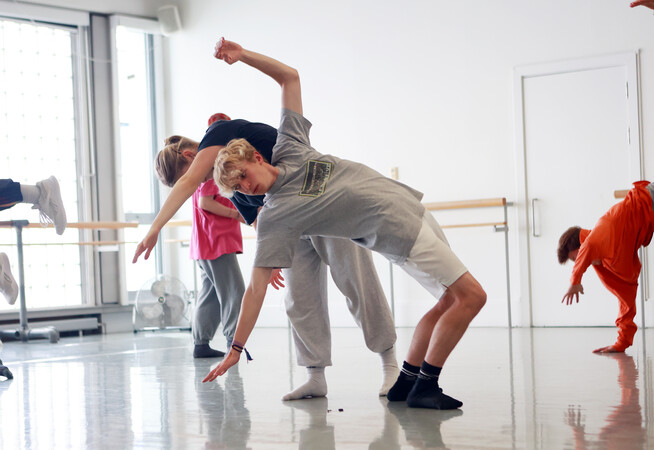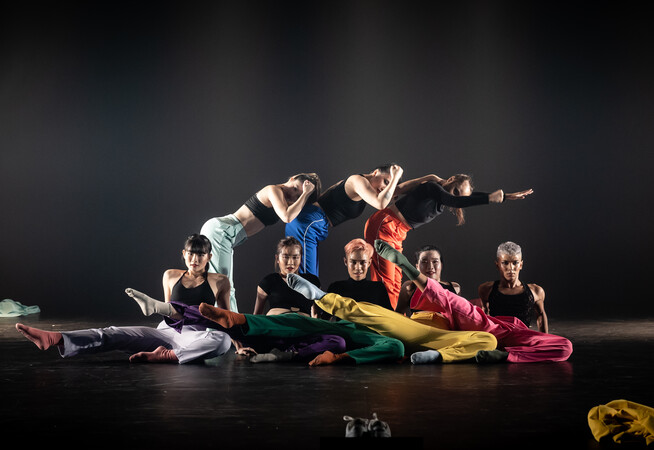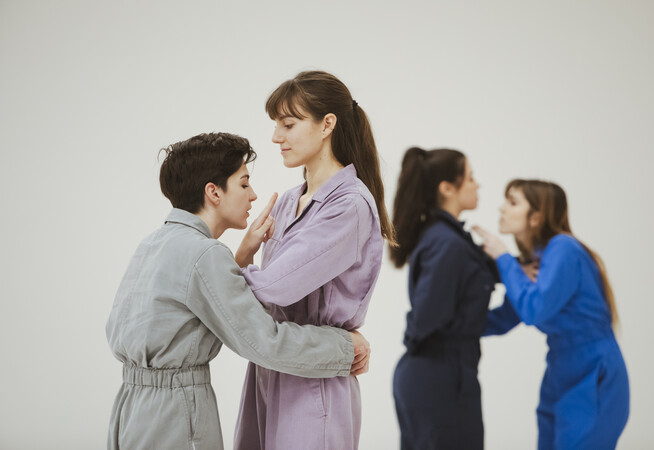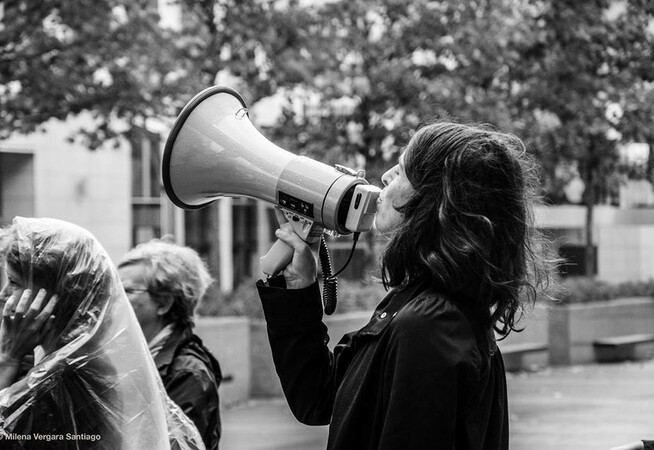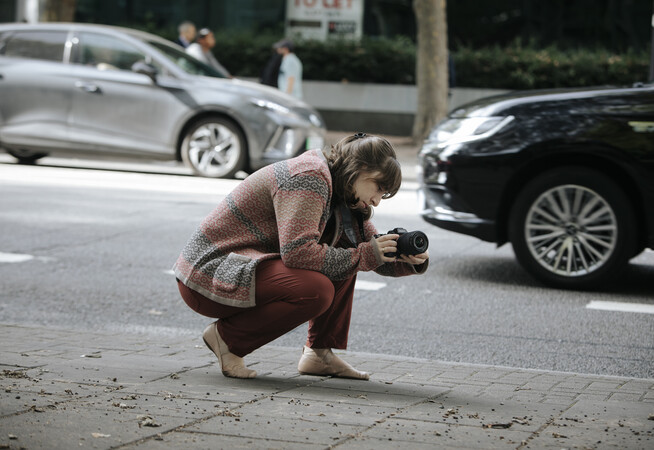Overseas Students
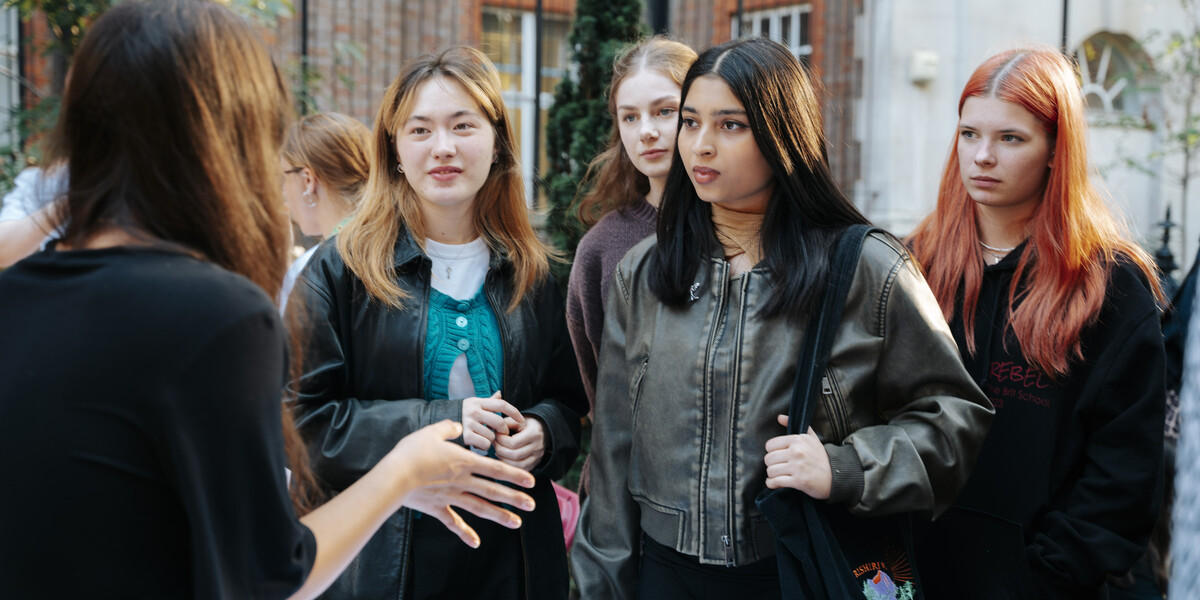
From wherever you are reading this, welcome to London Contemporary Dance School at The Place. Dancers from all over the world find a home here. No matter which level of study or course you join us for, you will be part of a vibrant student body of over 250 students, with international students from more than 50+ countries making almost 40% of it.
As a student you will be recognised as an individual and supported to follow your own artistic interests within a broad community of makers, leaders, educators, producers and performers. Our world-leading teaching faculty inspire and encourage you to develop as a well-rounded, creative dance artist, ready for a broad and varied career in dance and the creative arts.
We understand that our international applicants have many things to consider when applying for and choosing their dance school. To help you, we have outlined everything you need to know about courses, entry requirements, application process, visa, life in London, and more.
As you explore these sections, make a note of any questions and send them to our admissions team who will get back to you with answers and guidance: admissions@theplace.org.uk
Course Applications
Learn more about our suite of world-leading undergraduate and postgraduate courses and key information on how to apply
Undergraduate
Postgraduate
Entry Requirements
English Language Requirements
We expect all students to have a reasonable proficiency in written and spoken English in order to meaningfully participate in any programme at LCDS.
The standard English language requirements for all degree courses at LCDS are:
English Language IELTS level 6.5 with a minimum of 5.5 in reading, writing, listening, and speaking
You can find free resources and practice tests here
PRE-SESSIONAL SHORT COURSES TO PREPARE FOR IELTS
We understand that English is not everybody's first language and as such, you may need additional support with preparing for the IELTS. If you feel there is a chance you may not achieve the required IELTS scores without further support, we recommend opting for one of the pre-sessional short courses listed below to improve your English and prepare adequately for the IELTS. All courses have the option to study online or in-person.
- UAL Pre-Sessional English Courses
- Kingston University Pre-Sessional English Courses
- De Montfort University Pre-Sessional English Courses
Please note: If you are choosing to apply to one of these courses, apply as EARLY as possible to avoid missing deadlines to submit your IELTS scores or applying for a visa, which relies on your IELTS score as well. The courses can also sell out quickly.
Academic Requirements
Undergraduate
For our BA courses, international applicants are required to have the equivalent EU/International qualifications of the below listed qualifications (such as International Baccalaureate Diploma):
1. Three GCSE passes at grade 4 or above (grade 4 - 9)
2. One or a combination of the following accepted full level 3 qualifications:
- Passes in 2 A Levels
- Pass, Pass, Pass (PPP) at BTEC Extended Diploma (preferred subjects include Dance, Performing Arts or Musical Theatre)
- Pass at UAL Extended Diploma
- Access to Higher Education Diploma
Specific course requirements for each course are available on the respective course pages.
Postgraduate
For our MA courses, the standard requirement is to have a three or four year BA degree or equivalent academic qualification.
Alternative qualifications and experience can also be taken into consideration if you have not received formal education. These can be:
- Related academic or professional experience in in dance, film, arts, media, fine arts, performance, or similar field
- The quality of the personal statement
- A strong academic or other professional reference
- A combination of these factors
Specific course requirements for each course are available on the respective course pages.
How To Apply
Overview of Application Process
Depending on which course you are applying for, there will be a slightly different application process. Here's an overview of how it works for each course
CertHE Preparation for Contemporary Dance
Step 1: Online Application Form
Step 2: Admission Workshop (Audition)
Step 3: Interview
BA (Hons) Contemporary Dance Performance
Step 1: Online Application Form
Step 2: Admission Workshop (Audition)
Step 3:Interview
BA (Hons) International Contemporary Dance Practices
Step 1: Online Application Form
Step 2: Admission Workshop (Audition)
Step 3: Interview
MA Dance: Performance
Step 1: Online Application Form
Step 2: Admission Workshop (Audition)
Step 3: Interview
MA Dance: Participation, Communities, Activism
Step 1: Online Application Form
Step 2: Interview
MA Screendance
Step 1: Online Application Form
Step 2: Interview
Stage 1 - Online Application Form
First, you must complete our online application form where you input details about yourself, your educational and dance history, as well as a personal statement about why you want to join LCDS. We encourage you to complete your application form at the earliest possible as submissions will be viewed on a first come first served basis. If you are applying to a course which includes an admissions workshop (audition), you will select the date and location for your audition on this application form as well and it is important to apply at the earliest to secure a spot at your desired location.
Applying to LCDS is free – we do not charge an application or audition fee.
Application forms can be found on the individual course pages - click the 'Apply Now' button when you go to the course page you wish to apply to.
If you have any questions or need some help with the application form, please get in touch with our Admissions Team.
Stage 2 - Admissions Workshop (Audition) if applicable
FOR UNDERGRADUATE COURSES AND MA DANCE: PERFORMANCE
Our auditions are referred to as 'admission workshop', as we do not host them in the conventional way.
If you are applying to our Undergraduate courses or the MA Dance: Performance course, you will attend an admission workshop as part of the application process.
Once you submit your application form, our admissions team will invite you to an admission workshop (online or in person depending on your location), with details of what to expect on the day.
At our admission workshops you do not need to present a dance piece. Instead, you will be participating in three practical workshops, where our admissions panel will assess your willingness to learn, ability to understand instructions and creatively improvise, and your ability to adapt to new or unfamiliar dance styles.
Stage 3 - Interview
All courses will include an interview with our admissions panel. This will be in-person or online depending on your location. We will send you the questions prior to the interview so you will have time to prepare your answers. This interview is a two-way conversation, where we welcome you to ask us questions about the course and the school as well.
After your interview, the admissions team will be in touch via email (approximately two weeks after your interview date) with an outcome.
Applying through agents
London Contemporary Dance School at The Place has entered into a commercial arrangement with the following education agents, who are our official representatives. They are contracted to support qualified prospective students to choose a course, submit an application, find accommodation, and apply for a visa as appropriate to the prospective student’s circumstances.
If you enrol with us, we pay the education agent a commission/fee. The terms of the payment structure between provider and education agent are commercially sensitive, and this guide does not dictate how these terms are set or agreed. However, we do explore best practices in managing the wider financial relationship. 1 Competition Act 1998 available here.
Please note, there have been examples of unofficial education agents claiming to represent us. You can choose to use other education agents if you wish, but we spend resources on training and helping these education agents to offer the best possible service, and we strongly encourage you to only use our official education agent listed here. Please check this list to be sure you are using an official partner of London Contemporary Dance School.
At the moment, there is only one agent in the list, which is:
Uyee International Art Education Co. Ltd, Beijing
Phone: +86 10 85974123
Email: lili@uyeeart-edu.com
Address: 5th Floor, Block C, Yingke Center, No. 2A, Gongti Beilu, Chaoyang District, Beijing, China
If you are an applicant from China, please reach out to the above to learn more about LCDS, and they will be able to guide you free of charge.
The Place/LCDS is committed to the UK Agent Quality Framework. See our AQF pledge document here.
International Auditions Sept 2026 Entry
Cert HE Preparation for Contemporary Dance
Below are the locations and dates for our international auditions.
Sun 28 Dec - Seoul, South Korea
Sat 03 Jan - Shanghai, China
Sun 04 Jan - Beijing, China
Sun 25 Jan - Oslo, Norway
Sat 31 Jan - Mumbai, India
Fri 06 Feb - Online
Sat 07 Feb - LASALLE, Singapore
Sun 08 Mar - Mexico City, Mexico
Our ONLINE auditions are open to all, if you cannot make it to one of the locations listed above.
Overseas students are also welcome to attend auditions at The Place in London or at one of our regional locations - Newcastle (Northern England), Cornwall (Southern England), or Nottingham (Midlands) if you are able to travel to any of these locations. You will find the full list of dates and locations on the application form.
Get in touch with us at lcds@theplace.org.uk for any concerns or questions.
BA (Hons) Contemporary Dance Performance
Below are the locations and dates for our international auditions.
Sun 28 Dec - Seoul, South Korea
Sat 03 Jan - Shanghai, China
Sun 04 Jan - Beijing, China
Sun 25 Jan - Oslo, Norway
Sat 31 Jan - Mumbai, India
Fri 06 Feb - Online
Sat 07 Feb - LASALLE, Singapore
Sun 08 Mar - Mexico City, Mexico
Our ONLINE auditions are open to all, if you cannot make it to one of the locations listed above.
Overseas students are also welcome to attend auditions at The Place in London or at one of our regional locations - Newcastle (Northern England), Cornwall (Southern England), or Nottingham (Midlands) if you are able to travel to any of these locations. You will find the full list of dates and locations on the application form.
Get in touch with us at lcds@theplace.org.uk for any concerns or questions.
BA (Hons) International Contemporary Dance Practices
Auditions for the BA (Hons) International Contemporary Dance Practices will take place in Singapore.
Sat 07 Feb - LASALLE, Singapore
Get in touch with us at lcds@theplace.org.uk for any concerns or questions.
MA Dance: Performance
Below are the locations and dates for our international auditions.
Fri 17 Oct - Bucaramanga, Colombia
Sun 28 Dec - Seoul, South Korea
Sat 03 Jan - Shanghai, China
Sun 04 Jan - Beijing, China
Sun 01 Feb - Mumbai, India
Sat 07 Feb - LASALLE, Singapore
Sun 01 Mar - New York City, USA
Sat 07 Mar - Mexico City, Mexico
Sun 14 Mar - Los Angeles, USA
Get in touch with us at lcds@theplace.org.uk for any concerns or questions.
Fees & Funding
Fees
International fees for all courses as well as information on funds, bursaries, and scholarships can be found here
The Student Fund
The Student Fund has been developed to support and relieve some of the financial pressures students face, making it possible to enrol and remain on our courses. It is open to any registered student whether undergraduate, postgraduate, home or overseas status.
How do I apply?
If you are applying to study with us to start in 2025/26, further information and an application form for The Student Fund will be sent to you after an offer is made. Any funds awarded will only be transferred once you have accepted your place and have formally registered with us.
Can I only apply for the Student Fund once?
No, once you are enrolled as a student you are able to apply to the Student Fund at any point in the year. If you were unsuccessful in your first application you can re-apply as we are aware financial situations can change. All students are invited to apply to the Student Fund for each subsequent year of their studies.
Global South Scholarship (GSS) for MA Dance: Participation, Communities, Activism
We offer two full fee scholarships for those living and working in the Global South.
You apply for the scholarship through the online application form for the MA Dance: Participation, Communities, Activism course.
Each scholarship covers the overseas course fee in full.
The course is free for two GSS scholars each year. Students are responsible for their own travel costs to London and also for accommodation in London and visa applications (if necessary). London Contemporary Dance School has a fund to support students in financial need which you may be able to apply to if you are awarded the scholarship. We cannot, however, guarantee that you would be awarded funds for your travel, accommodation and visa costs, so you are asked to engage in other fundraising activities to support these elements of your studies.
To be eligible for this scholarship, you must live and work in one of the countries of the Global South, either permanently or regularly, and intend to complete at least part of your MA course living and working in that country.
If offered an interview, you will be asked to provide evidence of an existing artistic practice with communities in the country.
It does not have to be your official place of residence.
To be eligible for a Global South Access Scholarship, you must live and work on a regular basis in one of the countries on the list from the Finance Center for South-South Cooperation: Organization in Special Consultative Status with ECOSOC of the United Nations. (Please note: For the purpose of this scholarship, China is not included).
Decisions on scholarships will be made based on two factors:
1) Financial need - this will be assessed at the point of your application to the course. There will be a series of questions that will help us evaluate your financial need.
2) The quality of the submissions and interview in the application process
The scholarship cannot be combined with other fee-waiver scholarships (the student must be self-funding).
The scholarship can be combined with other scholarships which support travel or living costs.
The student must enroll on MA Dance: Participation, Communities, Activism before the funding is released.
*Our definition of countries of the Global South is drawn from the Finance Center for South-South Cooperation: Organization in Special Consultative Status with ECOSOC of the United Nations.
US Federal Student Loans
We participate in the William D. Ford Federal Direct Loan (Direct Loan) Program. These downloadable guides below outline the types of loans available, how to apply for them and when and how they are disbursed.
Direct Loan Program offers loans from the U.S. Department of Education (the Department), lending the money directly to you through us.
There are also some differences in the names of the loans.
- The FFEL Program’s Federal Stafford Loans (subsidized and unsubsidized) are called Direct Subsidized Loans and Direct Unsubsidized Loans
- The FFEL Program’s Federal PLUS Loan is called a Direct PLUS Loan in the Direct Loan Program.
Please note that students studying at schools outside of the USA can apply for Direct Subsidised, Direct Unsubsidised and Direct PLUS loans but are not eligible for PELL or Teach Grants or Perkins loans. Additionally, please be aware that LCDS is currently unable to complete 1098T tax forms for US students.
Student Guide to Direct Loans in the US
VISA
Applying for a Visa
All prospective overseas students, including EU, EEA and Swiss nationals coming to the UK to study with us, will need to apply for a visa through the Student Visa route.
If you are applying to study on the MA Dance: Participation, Communities, Activism, and are an overseas student, you can study without requiring a student visa (as long as you are not resident in the UK in the times in between the two-week intensives), however you may need to apply for a Standard Visitor Visa to visit the UK for the in-person residencies. Check guidance for distance learning section here. Overseas students studying on this course will be unable to get a Student Visa, and therefore will be unable to live in the UK for the duration of the course.
Please check the Home Office website to see how much a Student Visa costs. You also pay the Immigration Health Surcharge as part of your application, which gives migrants access to the UK’s National Health Service (NHS). Students pay a lower rate, and you can find the exact Health Surcharge cost here.
You can apply up to 6 months in advance of your course starting. If applying from within the UK, you can apply 3 months in advance of course starting. Further guidance for EU, EEA and Swiss students can be found here.
Student Route Visa
Student route is a points-based immigration system. You need to demonstrate you meet the required 70 points with the following items:
Offer Letter: Demonstrating an offer from London Contemporary Dance School
Confirmation of Acceptance for Studies (CAS): A document issued by London Contemporary Dance School to sponsor your visa
English Language test results: Demonstrating that you meet the minimum required English proficiency level
Proof of finances: Demonstrating the ability to financially support yourself during your studies in the UK
Some countries qualify for differentiation arrangements however, the Home Office may request this paperwork at any point during the process. It is therefore essential you have this in place at the point of applying for the Visa. You will not qualify for differentiation arrangements if you are applying from outside of your home country.
What you will need to apply
A full list of documents needed for the Student Route visa can be found on the Home Office website here
- A valid passport
- Proof of academic qualification - formal transcript of confirmed grades
- Proof of English proficiency (IELTS results)
- Proof of finance - this demonstrates that you have funds to cover all of the tuition fees and a minimum of 9 months of living costs. Please note: These funds must be within your or your parent/legal guardian's bank account for 28 consecutive days prior to your visa appointment. If you are relying on your parent(s)' funds you will also need to include the following documents:
- Letter of consent from your parent(s)/legal guardian
- Your birth certificate or adoption documents demonstrating proof of parent/guardianship
If your documents are not in English, you will need to submit translations of these documents.
Helpful tips and important reminders
Applying for a visa can be a stressful process. However, it is important to be diligent and ensure you have the right documents to avoid complications or refusal of visa. Below are a few tips and reminders to keep in mind:
- Firmly accept your offer in a timely manner
To apply for a student visa, you will need a Confirmation of Acceptance for Studies (CAS) from the school.
This is an essential part of your visa application. It shows that we are accepting you as a student and expect you to join our course. We can only issue a CAS to students who have firmly accepted our offer and met all their offer conditions.
If you are starting a new course, we will start preparing your CAS when you have firmly accepted your offer and met all offer conditions and paid any required deposits (if applicable).
A delay in accepting your offer with us will delay the visa process as well.
- Keep an eye on visa appointment dates in your city/country
Many countries require an in-person appointment to submit the visa application and provide biometric information. Visa appointments can sometimes be hard to book due to availability of appointments. It is advisable to keep an eye on availability of appointments and plan things accordingly.
It is also advisable to book your appointment no later than mid-July, so that you have enough time to get your passport back and also resubmit your visa application in case of any complications ahead of coming to the UK in September.
- Proof of Finance
Financial proof can often be the most complicated component of the visa application.
Anyone applying overseas will need to prepare evidence of funding for tuition fees and your living expenses, including accommodation. We will generally not check your financial evidence if you are an applicant applying overseas, but we do reserve the right to verify your financial evidence before issuing your CAS in certain cases.
There are strict requirements for the amounts and forms of evidence accepted by UK Visas and Immigration (UKVI). It's essential to get it right or your application will be refused.
Students from certain countries which are classed as 'differentiated' (or 'low risk') by UKVI don't need to provide financial evidence or evidence of academic qualifications with their visa application, but you must still have this financial and academic evidence in the required format in case you are asked to submit evidence later. Check the UK government website for the list of countries this applies to.
Start planning your financial evidence early. If you or your parents are funding your studies, you will need bank statements showing you have held the required funds in your account for at least 28 days before you submit your application. The proof of finance must be no more than 31 days old before you pay for your visa application.
Let's break this down for clarity.
You will need bank statements showing you have held the required funds in your account for at least 28 days before you submit the application:
For example, if you are paying for your visa application on the UKVI website on 25 May 2025, you must transfer the required funds into your or your parent/guardian's bank account by or before 24 April 2025, and ensure the funds remain in your bank account for 28 consecutive days. You must make sure that your bank balance does not drop below the amount of required funds for even a single day in the 28-day period.
The proof of finance must be no more than 31 days old before you pay for your visa application:
For example, if you are printing out bank statements to submit at your visa appointment, you must make sure that they are printed within 31 days of your appointment date. It is advisable to print them as close to the submission date as possible, to show the most recent version of your finances.
If you will be funded by an official sponsor, you must obtain a sponsorship letter from them containing all the information required by UKVI.
Your funding evidence must include:
- tuition fees for the first year of your course – or for the full course duration if it's a one-year course or shorter
- living expenses of £1,136 per month for the first nine months of your course (£10,224) – or for the full course duration if it's shorter than nine months.
- additional living expenses of any eligible family members, at a rate of £680 per person per month, for the first nine months of your course (£6,120 per person). Check if you are eligible to bring family members to the UK as dependents on the UK government website. Further guidance on Dependent eligibility is available from the UK Council for International Student Affairs (UKCISA), and directly from the Visa and Immigration team.
Tuition fees you have already paid to the school will be included in your CAS, but you will need financial evidence for the remaining fees and living expenses.
Take time to prepare your financial evidence correctly so that your visa application is successful. It is essential to read and understand the rules for the types of evidence you are using and prepare your financial evidence to follow these rules.
Please also allow for currency fluctuations and bank charges which may mean that you need to prepare more than the amounts quoted in GBP.
- Preparing supporting documents as early as possible
While your CAS will confirm which documents you need to submit as part of your visa application, it is advisable that you start preparing all necessary supporting documents as early as possible, so that you are able to apply for a visa as soon as you receive your CAS.
Securing original academic certificates and transcripts can sometimes take time. Make sure you start arranging for this at the earliest.
The English Language IELTS test certificate is valid for 5 years. You should aim to take your IELTS as early as possible, and have your test scores ready at the point of course application or at the point of accepting your offer. English language test certificate is needed for your visa as well, so make sure you keep it secure.
Students from some countries entering courses in selected subject areas must apply for an Academic Technology Approval Scheme (ATAS) certificate. Check on the UK government website to see if you will need an ATAS certificate. We will also contact you to advise you on the ATAS process. The ATAS is valid for a limited period so you shouldn't apply for it more than five months before you will begin your studies in the UK.
Students from some countries must take a tuberculosis test. Check on the UK government website to see if this applies to you.
Moving to London
Moving to a new country or city can seem daunting, but the prospect of exploring new places, cultures, and habits is equally exciting for both home and international students, the latter making up almost 40% of our student body.
London has been ranked as the best city in the world for students for another year in the QS Best Student Cities 2025 and there's good reasons for it.
No matter where you are from, you will find your community here in London. Whether it's food, art, or cultural celebrations, there will be a corner of this city where you will feel at home. However, most of our students find the prospect of stepping outside of their comfort zone and meeting people from different cultures to be the most exciting part about moving to a global city like London.
When it comes to social life, the vibrant, multicultural arts scene in London needs no introduction. Home to some of the most eclectic artists and repertoire, this city has everything one could want to explore artistically. As a dance student, your time in London will be filled with opportunities to meet and network with peers and artists from various cultural and professional backgrounds, and you will be instantly immersed in a thriving, diverse community of creatives at The Place and beyond.
You'll also find a huge number of academic resources and research institutes here and London universities can arrange access to rare and special collections. Being able to access these facilities can be invaluable for your research, studies and future career. There are over 1,000 museums and galleries, and 120 different libraries in London. The British Library is right opposite London Contemporary Dance School, housing over 150 million books, with three million new items added to its collection every year.
A glimpse of life in London
Accommodation - Our Partnership with the Londonist
Accommodation is often a big concern for our overseas students. We have a page dedicated to all the information you will need about finding accommodation in London here.
LCDS has also partnered with The Londonist who offer flexible student accommodation options that can be great as a short-term solution whilst you get settled into school life and explore housing in London. They offer short and long-term lettings ranging from as short as 2 weeks up to 51 weeks. They provide a variety of payment options which can help make your stay more affordable as well.
They have a large portfolio of rooms located in Central London, so you will likely find somewhere close to school, making your transition from your family home to independent living that much easier.
“The reason why I love Londonist is because they really try to make the transition period from coming from another country to live in London as easy as possible. And I really like how Londonist handles the payment process, because I am from another country and the currency is different if I have any problem with the payment process, they are always helpful and understanding. Also, their website is really helpful and clear.” - Portobello Residence
We highly recommend this option for our international students who need to not only familiarise themselves with the new environment at LCDS, but also London and the UK. Our Accommodation Support Workers can help you navigate how to book accommodation via The Londonist if you run into any issues.
The Place - Your Wider Network
London Contemporary Dance School sits within the larger umbrella of The Place, one of Europe’s most exciting, innovative dance spaces where artists from all over the world come to push creative boundaries, to experiment and to perform outstanding new work. Home to a production house making and touring new work; a 280-seat professional theatre; an extensive offer of classes, courses and opportunities for adults and young people and professional development programmes for artists, this creative and lively environment presents unparalleled opportunities for collaboration, networking, and growth.
Your time at LCDS will not just be spent learning in studios, but also widening your professional experience and networks at The Place and beyond. You will be placed right in the beating heart of the creative industry here in London, preparing you for life after graduation with a close inside-look into how dance organisations and the wider sector run.
Part-Time Work Opportunities
Living in London comes with added financial responsibilities, and most of our students work in part-time jobs.
Your student visa will grant you right to work for upto 20 hours a week as a student — keeping a healthy balance between your student life and work life.
The Place has various part-time opportunities available within the building itself, from working front-of-house on the theatre side, to working as teaching assistants for our children and youth dance classes or the Centre for Advanced Training programme.
As a dance student, you will be studying on highly intensive and practical courses on the BA or MA level. Our student support team is always available to guide you to maintain healthy schedules so you are not overexerting yourself.
Student Societies
Student societies create the opportunity to get together socially with other students across year groups and courses, and you will have plenty of opportunities to get involved in student-led initiatives.. Students are supported to develop, create and promote their societies and initiatives and are also given the resources with which to run them. Many of the societies at LCDS are dance focused, for example the opportunity to choreograph or focus on a particular practice. We also have groups that focus on self-discovery and advocacy.
